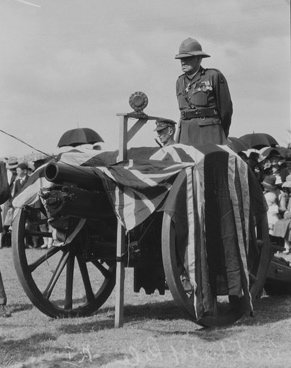Military chaplain
Military chaplain is a clergy member who is attached to a military unit, a military base, or a naval ship to provide pastoral care, spiritual support, and counseling services to armed forces personnel, regardless of their religion or belief system. The role of military chaplains extends beyond religious ceremonies to include moral guidance, ethical advisement, and the promotion of overall well-being among service members.
Roles and Responsibilities[edit | edit source]
Military chaplains have a diverse set of responsibilities that cater to the spiritual and emotional needs of military personnel. These include conducting worship services, performing religious rites, providing pastoral counseling, and facilitating religious education. They are also involved in crisis intervention, offering support during times of personal or collective tragedy such as death, injury, or disaster. Chaplains serve as confidential advisors to both the command and the enlisted, often acting as a bridge between the two and as advocates for ethical conduct.
History[edit | edit source]
The history of military chaplains dates back to ancient times, with evidence of religious leaders accompanying armies into battle to offer prayers, conduct rituals, and provide moral support. The formalization of the chaplaincy in military forces varies by country and is often linked to the establishment of organized national armies. In many cases, the role of the chaplain has evolved alongside the military, adapting to the changing needs and ethical considerations of armed service.
Appointment and Training[edit | edit source]
The appointment of military chaplains is typically governed by the military and religious institutions. Candidates are usually required to be ordained or recognized leaders within their religious communities and to meet the military's physical, educational, and security requirements. Training for military chaplains often includes both theological education and military instruction, preparing them to serve in a variety of settings and to address the unique challenges of military life.
Challenges[edit | edit source]
Military chaplains face unique challenges, including the need to provide spiritual care in a multi-faith environment, dealing with ethical dilemmas related to war and peace, and addressing the mental health issues that can arise from the stresses of military service. They must also navigate the complexities of serving both a religious institution and the military command structure, often requiring a delicate balance between adherence to religious principles and military objectives.
Controversies[edit | edit source]
The role of military chaplains has been subject to controversy, including debates over the separation of church and state, the inclusion of non-traditional religious or secular humanist chaplains, and issues related to proselytism and religious freedom within the military. These controversies reflect broader societal debates about religion, ethics, and the role of the military.
Conclusion[edit | edit source]
Military chaplains play a vital role in supporting the spiritual and emotional well-being of armed forces personnel. Their work requires a unique blend of religious commitment, military understanding, and the ability to serve in a pluralistic environment. Despite the challenges and controversies, the presence of chaplains within the military continues to be an essential component of military life, providing support and guidance to those who serve.
Search WikiMD
Ad.Tired of being Overweight? Try W8MD's physician weight loss program.
Semaglutide (Ozempic / Wegovy and Tirzepatide (Mounjaro / Zepbound) available.
Advertise on WikiMD
|
WikiMD's Wellness Encyclopedia |
| Let Food Be Thy Medicine Medicine Thy Food - Hippocrates |
Translate this page: - East Asian
中文,
日本,
한국어,
South Asian
हिन्दी,
தமிழ்,
తెలుగు,
Urdu,
ಕನ್ನಡ,
Southeast Asian
Indonesian,
Vietnamese,
Thai,
မြန်မာဘာသာ,
বাংলা
European
español,
Deutsch,
français,
Greek,
português do Brasil,
polski,
română,
русский,
Nederlands,
norsk,
svenska,
suomi,
Italian
Middle Eastern & African
عربى,
Turkish,
Persian,
Hebrew,
Afrikaans,
isiZulu,
Kiswahili,
Other
Bulgarian,
Hungarian,
Czech,
Swedish,
മലയാളം,
मराठी,
ਪੰਜਾਬੀ,
ગુજરાતી,
Portuguese,
Ukrainian
Medical Disclaimer: WikiMD is not a substitute for professional medical advice. The information on WikiMD is provided as an information resource only, may be incorrect, outdated or misleading, and is not to be used or relied on for any diagnostic or treatment purposes. Please consult your health care provider before making any healthcare decisions or for guidance about a specific medical condition. WikiMD expressly disclaims responsibility, and shall have no liability, for any damages, loss, injury, or liability whatsoever suffered as a result of your reliance on the information contained in this site. By visiting this site you agree to the foregoing terms and conditions, which may from time to time be changed or supplemented by WikiMD. If you do not agree to the foregoing terms and conditions, you should not enter or use this site. See full disclaimer.
Credits:Most images are courtesy of Wikimedia commons, and templates, categories Wikipedia, licensed under CC BY SA or similar.
Contributors: Prab R. Tumpati, MD






